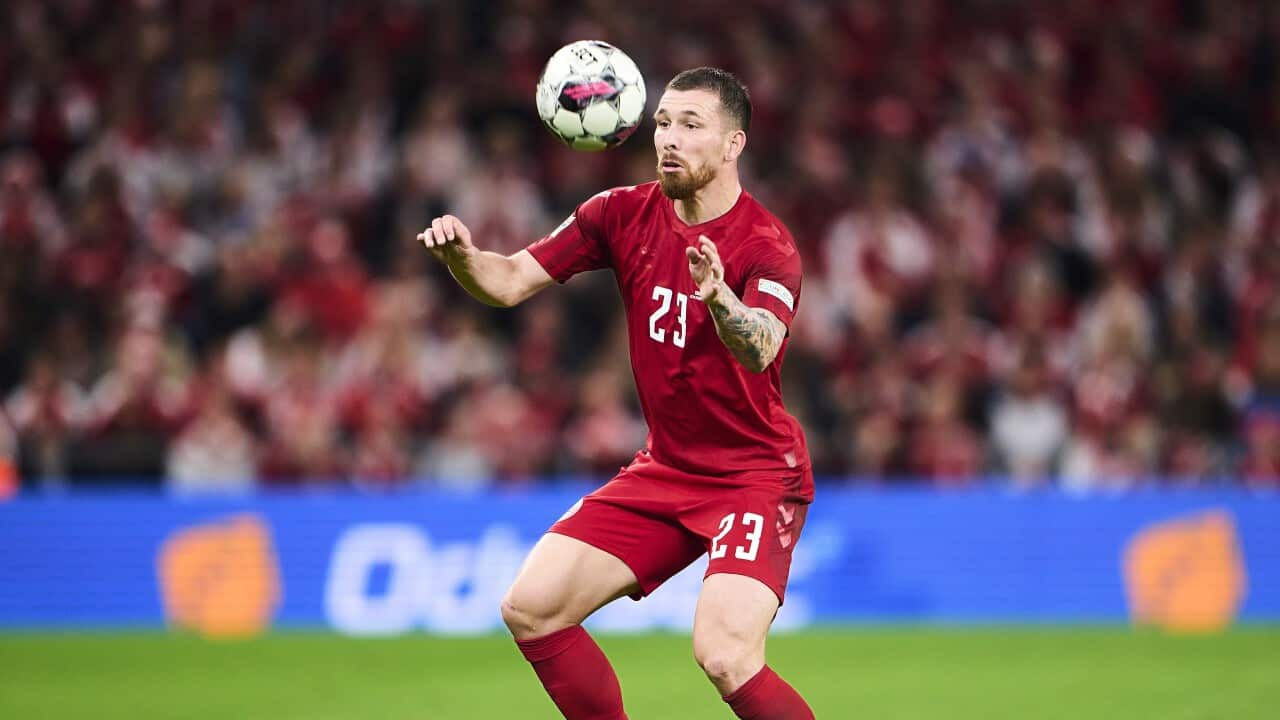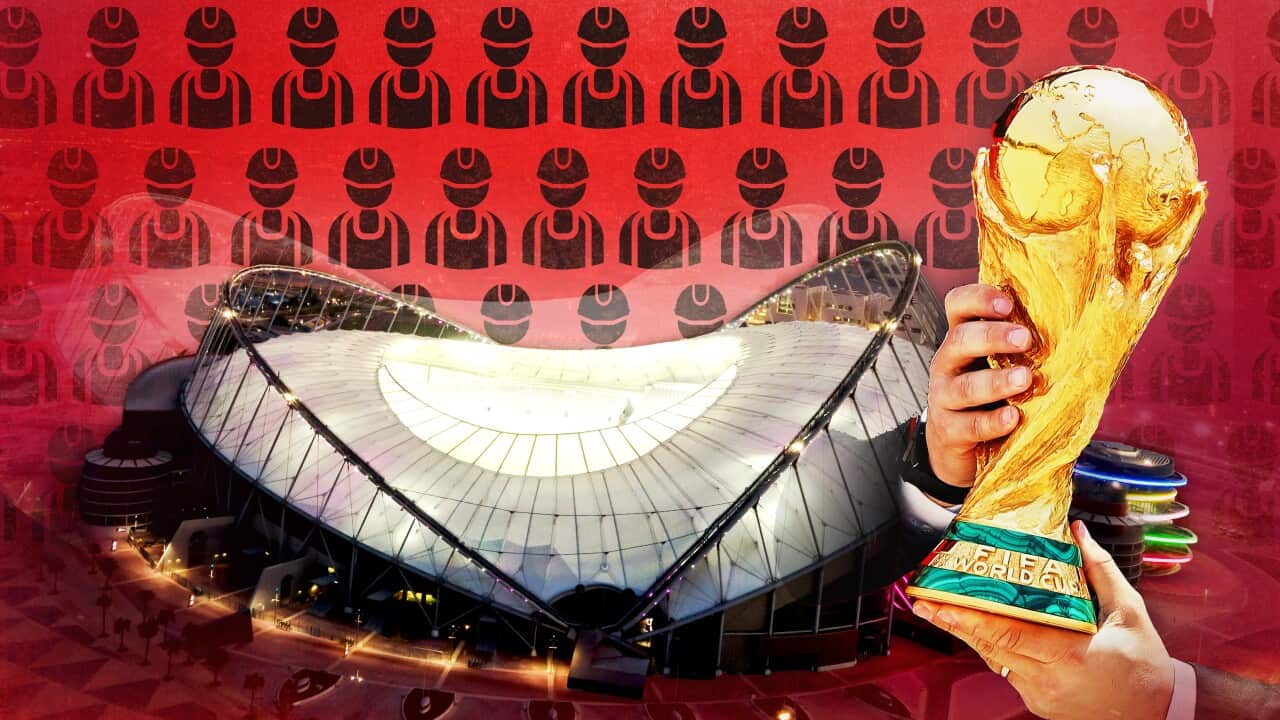Key Points
- The Socceroos have become the first World Cup playing side to collectively condemn the human rights records.
- In a video, players explain why they felt the need to address Qatar's treatment of migrant workers and LGBTIQ+
The Socceroos have become the first World Cup playing side to collectively condemn the human rights record of host country Qatar.
In a collective video statement, players each took turns addressing the camera to explain why they felt the need to address Qatar's treatment of migrant workers and members of the LGBTIQ+ community.
Under the country's 1971 Penal Code, sexual acts in same-sex relationships can result in a jail term of up to five years.
They said a motivation to speak out was understanding the power of the legacy they want to leave behind.
"There are universal values that should define football. Values such as respect, dignity, trust and courage," the players said in the video.
"When we represent our nation, we aspire to embody these values."
The players said they have spent the last two years learning more about the experiences of these groups, adding they do not claim to be experts, nor have all the answers.
"These migrant workers who have suffered are not just numbers. Like the migrants that have shaped our country and our football, they possessed the same courage and determination to build a better life.
"As players we fully support the rights of LGBTIQ+ people. But in Qatar people are not free to love the person that they choose.
"Addressing these issues is not easy and we do not have all the answers."
The team called for the implementation of measures including a migrant resource centre, effective remedy for those denied their rights and the decriminalisation of all same-sex relationships.
The Socceroos said they worked with a number of groups to come to their position on Qatar, speaking with the Professional Footballers Australia, FIFA, the Supreme Committee, the International Labour Organisation, FIFPRO and the migrant workers of Qatar.
Professional Footballers Australia praises 'courage of the players'
Professional Footballers Australia applauded the video statement, saying there is a recognition that the views "may not be universally popular".
The group urged people to keep the debate civil.
"Some will believe they have not gone far enough whilst others will call on them to stick to football and stay out of 'politics', despite this being a matter of human rights. This polarity says much about the courage of the players and also the increasingly fractured nature of the world," Professional Footballers Australia said.
"As we near kick-off, the players of every nation will continue to be asked about their position on Qatar.
"Acknowledging that the players did not award the World Cup host country is critical. They have no say in its delivery and operations.
"In the absence of leadership from administrators tasked with awarding hosting rights and managing the tournament, it has fallen to players, coaches and fans to provide moral leadership."
The German, Norwegian and Dutch National Teams have protested against Qatar's human rights record through slogans worn on T-shirts and uniform choices.
Norway's team had T-shirts with the words "Human rights, on and off the pitch". The Netherlands national team wore T-shirts with the words "Football supports change". The German team wore shirts each carrying a letter that together spelled "human rights".
What are the human rights concerns?
Last week, Amnesty International released an assessment of worker protection reforms implemented, finding that Qatari authorities had made some progress in putting in place protections for migrant workers, but much more remains to be done.
"Ultimately, human rights abuses persist on a significant scale today," the report entitled 'Unfinished Business' said.
"Given that both Qatar and FIFA have benefited from migrant workers’ labour, they cannot simply turn the page and forget those who suffered to make the event possible.
"They must work together to urgently establish a comprehensive remediation programme that provides financial compensation to workers and their families, and supports initiatives to prevent abuse in the future."
Since the country won the hosting rights a decade ago at least 6,500 migrant workers from India, Pakistan, Nepal, Bangladesh and Sri Lanka have died during the process of building football stadiums, according to an from government sources reported by the Guardian newspaper.
The lack of enforced worker protections and the use of the kafala sponsorship arrangement - which ties the legal status of the employee to the employer - created an environment where exploitative practices are used such as confiscated passports, stolen wages and crowded camps.
The first country in the Middle East to host the World Cup, Qatar is preparing for 1.2 million visitors during the tournament from 20 November to 18 December.
What has Qatar said?
In a televised speech earlier this week, Qatar's Emir, Sheikh Tamim bin Hamad al-Thani, criticised the allegations of human rights abuses, saying the campaign against Qatar had gone too far.
"We initially dealt with the matter in good faith," Sheikh Tamim said, adding that the initial remarks were seen as constructive.
LISTEN TO

Qatar World Cup organisers promise no LGBTIQ+ discrimination
SBS News
05/08/202204:53
But he said now the claims "include fabrications and double standards that were so ferocious that it has unfortunately prompted many people to question the real reasons and motives behind the campaign".
In August, Qatari officials during the tournament.
"Everyone will be able to come, enjoy the games and support their teams, regardless of their background, religion or gender," said Fatma Al-Nuaimi, the executive director of communications for the Supreme Committee for Delivery & Legacy of the tournament.












